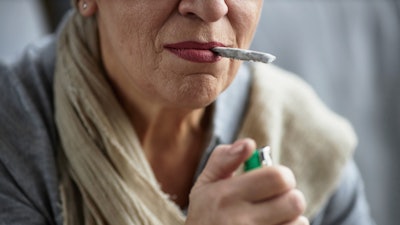
Not so long ago, young adults were the primary users of cannabis. However, women and adults more than 50 years old represent the fastest growing group of users. A new study also confirms the frequent use of cannabis by midlife women to manage an array of menopause symptoms.
With rapidly expanding legalization and normalization, recreational and medical cannabis use is increasing across all age groups. Past research largely focused on usage habits by men and younger adults. However, until now, little was known about the prevalence or characteristics of cannabis use among women in and after the menopause transition.
A new study based on data from more than 5,000 midlife women has sought to address this information gap by analyzing the frequency, forms and motives of cannabis use by primarily postmenopausal women.
Based on the results, the researchers concluded that cannabis use is relatively common in midlife women. Over 40% reported ever using cannabis for recreational or therapeutic purposes, most often to treat chronic pain (28%), anxiety (24%), sleep problems (22%) and stress (22%). Women who reported using cannabis specifically for menopause symptoms (6%) primarily reported targeting menopause-related mood and sleep difficulties.
More than 10% of study participants had used cannabis in the past 30 days, most often smoking (56%), ingesting edible products (52%), or using cannabis in more than one form (39%). Among those with past 30-day use, 31% reported smoking cannabis on a daily or near-daily basis, while 19% reported daily or near-daily use of edible cannabis products.
“We know that cannabis products are being marketed to women to manage menopause symptoms, and these findings suggest that midlife women are turning to cannabis for menopause symptoms and other common issues in the menopause transition. But we still do not know if use is actually helping for those symptoms, or if it may be contributing to other challenges.” says Dr. Carolyn Gibson, lead author and health services researcher at the University of California, San Francisco.
“These findings highlight the need for recognizing and discussing cannabis use in the healthcare setting” says Dr. Stephanie Faubion, medical director for The Menopause Society. “Additional research is needed to evaluate the potential harms and/or benefits of use.”






















